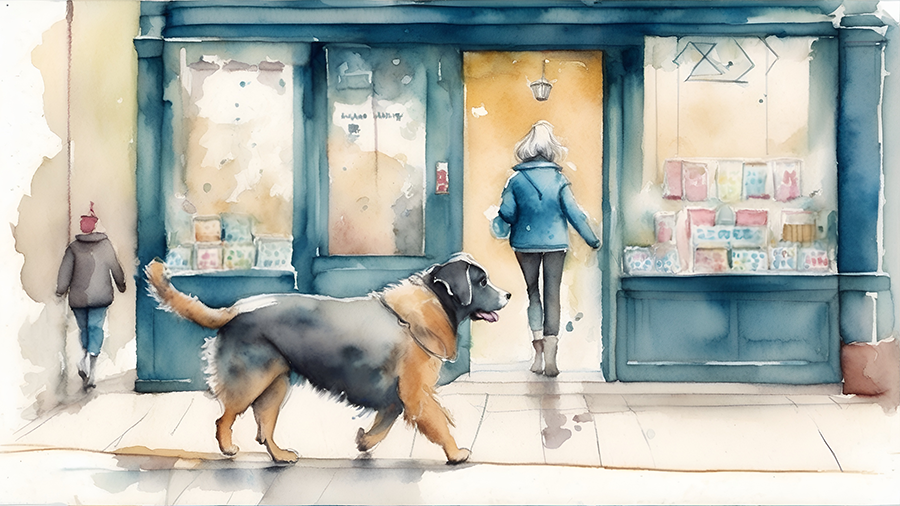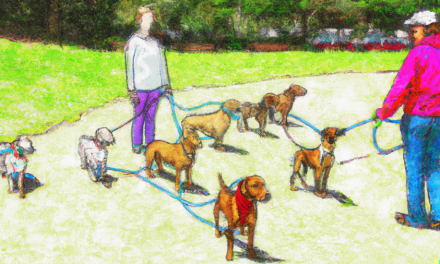Embarking on a new business venture, particularly within the bustling dog industry of the UK, is as exhilarating as it is daunting. One of the pivotal decisions that every entrepreneur must confront is the selection of an appropriate business structure. The structure you choose has a far-reaching impact, influencing everything from daily operations and tax liabilities to personal financial risks and growth potential. Making an informed decision in this domain is essential, as it can set the trajectory for the success and sustainability of your business.
The dog industry in the UK is diverse and multifaceted. It encompasses a range of services and professions tailored to the needs of man’s best friend. From dog walkers who ensure our pets get their daily exercise, to groomers who keep them looking their best, and sitters who offer a temporary home while owners are away. Then there are the pet shops, providing a plethora of products for our canine companions, and kennels offering more extended stays. Lastly, we have the veterinarians, the unsung heroes ensuring our pets remain healthy and vivacious. Each of these enterprises, while united in their passion for dogs, may find that different business structures best suit their unique needs and challenges. This guide aims to explore these structures, illuminating the pros and cons of each, to aid dog business enthusiasts in their entrepreneurial journey.
Is Becoming a Sole Trader the Right Choice for Your Dog Business?
In the realm of business structures, one of the most straightforward and commonly adopted options, especially for newcomers in the business world, is the ‘sole trader’ model. By definition, a sole trader refers to an individual who independently runs their business (also called ‘self employed’). They are the sole owner, and there’s no legal distinction between the owner and the business itself.
Pros:
- Simplicity: One of the primary reasons many opt for this structure is its sheer simplicity. There’s minimal paperwork involved in setting up as a sole trader, and the administrative burdens are comparatively low.
- Full Control: As the exclusive owner of your business, you retain full decision-making control. Every choice, from branding to daily operations, remains entirely in your hands.
- Straightforward Tax Arrangements: Sole traders typically find tax matters to be more direct. They pay tax on the business profits and are not required to manage complex corporate tax structures.
Cons:
- Unlimited Personal Liability: The most significant drawback is the unlimited liability aspect. If the business incurs debts or faces legal issues, the sole trader’s personal assets are at risk.
- Difficulty in Securing Funding: Lenders and investors often perceive sole traders as higher-risk ventures. This perception can make it challenging to secure loans or external funding.
Given its nature, the sole trader model seems particularly fitting for professions with lower startup costs and operational complexities. In the context of the UK’s dog business industry, it’s an excellent fit for dog walkers, sitters, and individual groomers. These professions typically don’t demand vast initial investments and allow professionals to kickstart their ventures with relative ease, making the sole trader structure a viable and often preferred choice.
Read more: https://www.gov.uk/set-up-sole-trader
Should You Opt for a Partnership Structure for Your Dog Business?
Navigating the world of business structures can be intricate, and one model that often garners attention is the ‘partnership’. Essentially, a partnership is established when two or more individuals come together with the shared objective of running a business. Unlike sole traders, partnerships allow for a collaborative approach, pooling together resources, skills, and expertise.
Pros:
- Shared Responsibility: One of the most prominent advantages of a partnership is the distribution of responsibilities. Tasks, risks, and daily operational burdens can be shared among partners, alleviating individual pressures.
- Potential for More Capital Input: With multiple stakeholders, there’s a higher likelihood of increased initial capital. This pooled financial resource can prove invaluable when setting up the business or during expansion phases.
- Diverse Skills and Expertise: Different partners bring varied skills to the table. This diversity can lead to a more holistic approach to business, addressing different facets from multiple perspectives.
Cons:
- Unlimited Liability: Similar to the sole trader model, partnerships generally come with the caveat of unlimited liability. Each partner can be held responsible for the business’s debts, unless the partnership is established as a Limited Liability Partnership (LLP).
- Potential for Disagreements: With multiple heads at the helm, there’s a natural potential for disagreements and conflicts. It’s crucial to ensure open communication channels and perhaps even have a partnership agreement in place to mitigate potential disputes.
Given the collaborative nature of the partnership structure, it’s particularly beneficial in sectors where teamwork is paramount. In the UK’s dog industry, vets practices are a shining example. With multiple professionals collaborating, partnerships allow for shared responsibilities and varied expertise. Additionally, businesses that offer combined services, such as grooming and sitting, might find partnerships advantageous, leveraging diverse skill sets to provide comprehensive services.
Read more: https://www.gov.uk/set-up-business-partnership/register-partnership-with-hmrc
Is a Limited Company Structure the Best Fit for Your Dog Business Expansion?
The business landscape is peppered with various structures, each tailored to different needs and scales. A prominent and often-considered model, especially for those eyeing expansion or a distinct separation from their venture, is the ‘limited company’. At its core, a limited company is a legal entity entirely separate from its owners, who are known as shareholders.
Pros:
- Limited Liability: A standout benefit of a limited company is the limited liability accorded to its shareholders. In case of debts or legal issues, the personal assets of shareholders remain protected, with their liability limited to the amount they’ve invested.
- Potential Tax Benefits: Operating as a limited company can offer certain tax efficiencies. For instance, companies might benefit from lower corporation tax rates and can provide dividends to shareholders, which could result in tax savings.
- Professional Image: Incorporating as a limited company can enhance the business’s reputation, instilling a sense of trust and professionalism among clients, suppliers, and potential investors.
Cons:
- More Complex Administration: With the establishment of a separate legal entity comes the added responsibility of more intricate administrative tasks, including annual filings, accounting obligations, and statutory records maintenance.
- Costs for Setup and Ongoing Management: Establishing and maintaining a limited company incurs costs. From initial registration fees to annual accountancy charges, these costs can add up, especially for businesses on a tight budget.
In the context of the UK dog industry, the limited company structure especially resonates with larger operations, such as expansive pet shops or kennels. It’s also an ideal choice for any dog-related business that’s looking to scale, gain investment, or simply wishes to maintain a clear distinction between personal and business assets and liabilities.
Read more: https://www.gov.uk/limited-company-formation/register-your-company
Is a Limited Liability Partnership (LLP) the Ideal Structure for Your Multi-faceted Dog Business?
Navigating the varied business structures, a unique model that often catches the eye of professionals seeking both collaboration and legal protection is the Limited Liability Partnership (LLP). Straddling the line between traditional partnerships and limited companies, the LLP offers a hybrid solution tailored to specific business needs.
Pros:
- Limited Liability: One of the foremost attractions of an LLP is the limited liability granted to its members. This ensures that, should the business encounter debts or face legal actions, individual members’ personal assets are shielded from risk, with their exposure limited to their contribution in the LLP.
- Flexibility in Sharing Profits: Unlike limited companies where profit distribution is bound by shareholding percentages, LLPs provide flexibility. Members can decide and agree upon diverse ways of distributing profits, ensuring a structure that mirrors their contributions and understanding.
Cons:
- Minimum of Two Members: By definition, an LLP requires at least two members. This means individual entrepreneurs or those looking to maintain sole control might find this structure unsuitable.
- Increased Administrative Duties: While offering many benefits of a limited company, an LLP also brings along more administrative responsibilities compared to a standard partnership. This includes annual account submissions and other statutory requirements.
Within the realm of the UK’s vibrant dog industry, the LLP model finds particular resonance with professional services, notably vets practices. The structure allows multiple professionals to collaborate, offering their distinct expertise, while also enjoying protection against personal liability. Furthermore, multi-faceted dog businesses that combine various services – for instance, grooming alongside pet sitting – might find the LLP advantageous, blending the collaborative spirit of partnerships with the protective shield of limited liability.#
Read more: https://www.gov.uk/business-and-industry/limited-companies-and-partnerships
Is an Unincorporated Association the Right Structure for Your Dog-Centric Community Initiative?
Diving into the myriad of business structures, the concept of an ‘unincorporated association’ (like a club) is often explored by those with community-centric or non-profit ambitions. At its essence, an unincorporated association is a collective of individuals who join hands for a specific purpose, generally leaning towards non-commercial objectives.
Pros:
- Simplicity in Formation: One of the primary benefits is the straightforward setup. There’s no administrative tape to navigate, making it an appealing choice for smaller community groups.
- No Registration Fees: Getting started as an unincorporated association typically comes without the burden of registration fees, ensuring minimal barriers to entry for community-driven endeavours.
Cons:
- Not for Profit-driven Ventures: Given its foundational principles, this structure isn’t the go-to for businesses with profit-making aspirations.
- Potential Member Liability: Unlike structures that offer limited liability, members of an unincorporated association might find themselves personally liable should the association face financial or legal challenges.
In the context of the UK’s passionate dog community, the unincorporated association framework shines for specific endeavours. It’s especially apt for dog rescue organisations, focused on the noble task of rehabilitating and rehoming canines. Moreover, grassroots community initiatives centred around canine welfare, training, or awareness campaigns can thrive under this structure, given its ease of setup and inherent community spirit.
Read more: https://www.gov.uk/unincorporated-associations
Which Business Structure Best Suits Your Dog-Centric Venture in the UK?
Choosing the appropriate business structure is foundational for any venture. It sets the tone for future growth, scalability, and operational fluidity. Within the niche of dog businesses, certain structures align more aptly with specific service offerings. Here’s a detailed exploration:
Dog Walkers:
For those entering the dog walking industry, simplicity is often key. The business model is generally straightforward, primarily involving direct service provision without the complications of extensive inventory or large-scale operations.
- Sole Trader: This structure shines for individual dog walkers. The ease of setup, combined with the minimal administrative requirements, allows passionate individuals to quickly start their ventures. As the exclusive owner, the walker retains full control, ensuring that the service quality aligns perfectly with their vision.
- Partnership: If you’re considering collaborative efforts, perhaps joining hands with another dog walker or venturing into complementary services, a partnership might be apt. It ensures shared responsibilities and can be beneficial for pooling resources or covering larger geographical areas.
Dog Groomers:
The dog grooming industry varies in scale, from independent groomers operating from their homes to expansive salons with multiple employees.
- Sole Trader: Independent groomers, especially those just starting, might find the sole trader structure fitting. It’s simple, offers full control, and keeps administrative burdens low.
- Limited Company: For larger grooming salons or those with an eye on expansion, incorporating as a limited company offers advantages. Not only does it enhance the professional image, but it also ensures limited liability, crucial when managing a larger operation with increased client interactions.
Dog Sitters:
The demand for trustworthy dog sitters has surged, and the business models can range from individual sitters to brands with multiple locations.
- Sole Trader: Individual dog sitters, operating from their residence or offering home visits, might find the sole trader structure aligning with their needs. It’s straightforward and offers complete control over operations.
- Limited Company: Those aiming to transform dog sitting into a broader business, perhaps expanding to multiple locations or integrating additional services, should consider the limited company route. It allows for scalability, ensures limited liability, and can attract potential investors or partners.
Pet Shops:
With diverse product ranges, potential for online and offline sales, and liability concerns, pet shops require a solid foundation.
- Limited Company: Given the scale and potential liability concerns, pet shops are best structured as limited companies. This ensures the owner’s personal assets remain protected. Furthermore, with potential partnerships or collaborations with suppliers and brands, the professional image of a limited company can be advantageous.
Kennels:
Kennels, much like grooming services, can range in scale, from small setups to large operations catering to numerous pets.
- Sole Trader: For small, individual-led kennels, particularly those operating from personal properties or with limited capacities, the sole trader structure might be suitable. It offers simplicity and direct control.
- Limited Company: Larger kennel operations, especially those with multiple employees, extensive facilities, or additional services, should lean towards the limited company framework. It provides a shield against potential liabilities, especially given the extended durations pets might stay, and offers a foundation for growth and expansion.
Vets:
Veterinary services are unique, blending professional expertise with collaboration and potential for scalability.
- LLP (Limited Liability Partnership): For vet practices aiming to combine the collaborative nature of partnerships with the protective benefits of limited liability, the LLP structure is ideal. It’s particularly fitting for practices with multiple professionals, ensuring each member’s personal assets are protected.
- Partnership: Smaller vet practices, especially those where a few professionals come together without the need for complex structures, might find traditional partnerships suitable. It allows for shared responsibilities and a combined approach to service provision.
In conclusion, while the dog industry in the UK is diverse, understanding the nuances of each business type and aligning them with the appropriate structure is pivotal. It not only ensures smoother operations but also provides a strong foundation for growth, expansion, and sustained success.
Conclusion:
Selecting the right business structure isn’t merely a formality; it’s a pivotal decision that influences operational fluidity, legal protections, and growth potential. Whether you’re an individual keen on a solo venture or a team envisioning a large-scale enterprise, aligning with an appropriate structure considering both your present status and future aspirations is crucial. It’s always advisable to consult with business advisors or solicitors to ensure that your chosen structure is not only compliant but also aligns best with your business vision and goals.








